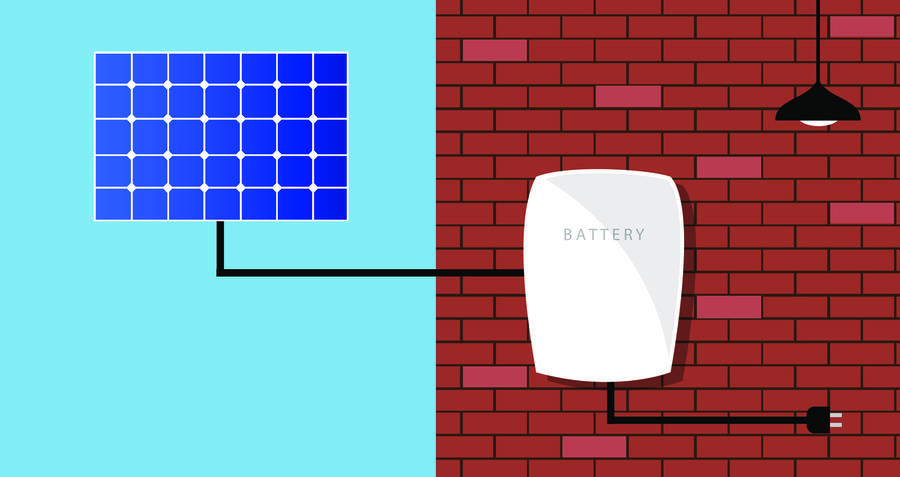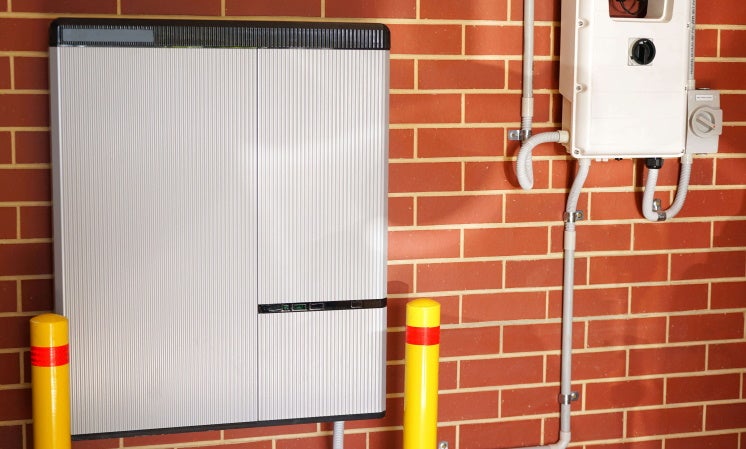Last update July 10th, 2024 at 05:24 pm
Everyone is talking about how much solar batteries cost. Solar energy is very popular in Australia, thanks to good rebate schemes and a sunny climate that ensures high solar efficiency. When going solar, you are able to choose between different solar systems.
A stand-alone solar panel system with no grid connection will need a solar battery. Systems like this may offer many benefits, but it also comes with a price. So, how much do solar batteries cost in Australia?

Solar batteries are quite expensive
When investing in solar panels a significant part of your costs will be covered by the government STC rebate. In a few states, you may also get a solar battery rebate, but in most cases, you will have to cover the costs yourself.
The average price for solar batteries is as follows:
- 3 kWh: $4,110
- 8 kWh: $10,160
- 14 kWh: $15,860
- 18 kWh: $24,480
As you can see, solar batteries are quite expensive. If you need an inverter as well, you can expect the costs to be somewhat higher.
Also, note that this is the price you can expect to pay for the battery only. We also assume that you already have a solar panel system that is battery-ready. If you need to upgrade the system, this may lead to extra costs.
Do you need a solar battery?
No, not necessarily. This will depend on what kind of solar panel system you have. If you have a grid-connected solar system, which is the most common among Australian residents, you do not need a solar battery.
With a grid-tie solar system, your home is still connected to the grid, and you may import electricity when the solar panels do not produce a sufficient amount of energy. Excess energy will be sold through the grid.
Alternatively, you can have a stand-alone solar system with no grid connection and a battery.
What are the benefits of a solar battery?
The biggest benefit you will get from having a solar battery is the opportunity to store excess electricity in the battery (relevant when the solar panels produce more solar energy than your household uses).
When the system is not producing enough electricity, during the night or on days with poor sun conditions, you can use the stored energy.
In general, it is more beneficial to use the power produced by your solar system rather than sell it. The reason is simple: The feed-in tariff is now lower than the retail cost of electricity. With a solar battery, you can increase your self-consumption rate and save money.
With a stand-alone solar system with a battery, you will not have any grid connection. This means that you will no longer receive an electricity bill and that your solar system produces all the energy used by the household’s appliances.

Rebate schemes for solar batteries
All Australians are eligible for the national STC rebate, but this will only cover some of your solar panel and inverter costs (not solar batteries). However, in some parts of Australia, you might be able to find local battery rebate schemes or interest-free loans.
These rebates will be given on top of the national STC rebate. A battery rebate can without a doubt make solar batteries more affordable. Let’s take a closer look at some of the battery rebates that exist in Australia!
New South Wales (NSW)
Residents living in New South Wales can benefit from the Empowering Homes scheme, which will give them a solar and battery subsidy. NSW homeowners may get an interest-free loan of up to $14,000 that can cover the costs of the solar and battery system.
Australian Capital Territory (ACT)
In ACT you can receive the Next Gen Battery Rebate. This rebate will cover $3,500 or 50% of the battery cost, excluding the GST.
Victoria (VIC)
As a Victorian, you will have access to a number of rebate schemes, including a solar battery rebate. This may cover up to $2,950 of the battery cost.
South Australia (SA)
People living in South Australia had access to battery rebates of up to $2,000 through the Home Battery Scheme until July 2022. Note that this scheme is no longer offered.
Northern Territory (NT)
Both businesses and private households in the Northern Territory may benefit from the Home and business battery scheme. This may cover up to $6,000 of the battery costs or $450 per kWh.
How much will solar batteries cost in the future?
According to experts, solar battery prices will probably not fall until 2024. The battery price decreased somewhat between 2017 and 2018, but in the last few years, the price has been very stable.
Exactly how much solar batteries will cost in the future, only time will show. Factors like supply and demand are important factors that are difficult to predict.
But remember, as long as you have a grid-connected solar system, a battery is not needed. To find out if a battery is a good choice for your needs it is best to start with a quote from a couple of CEC-approved installers.